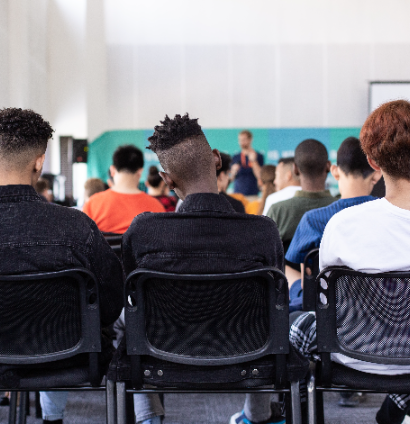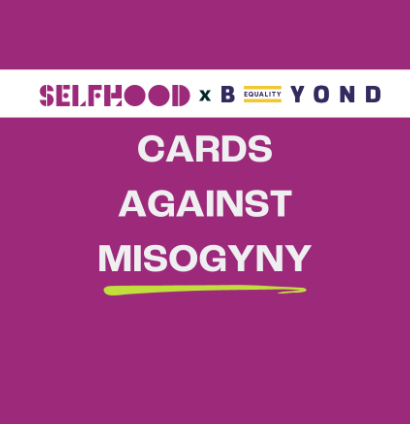The real-world manosphere

Online misogynistic extremism is having a profound impact on every facet of our society. From classrooms to boardrooms, from the kitchen table to the dispatch box, it is crucial to be able to identify ideas that have their roots in the manosphere.
The manosphere starts with boys
Teachers are witnessing in real time alarmingly radical misogynistic beliefs among some of their students. We’ve spoken to teachers who report students from their very early teens showing admiration for online misogynists such as Andrew Tate. In her seminal book on the subject, Laura Bates describes assemblies that are supposed to focus on gender equality or consent being significantly disrupted or boycotted altogether by boys who parrot sexist tropes that women who claim they’ve been sexually assaulted are probably lying or that feminism means women will have more rights than them.
In October, a couple of the Selfhood team went out in London to talk to people about their views on online sexism. We spoke to a 9 year old boy and his mother who was shocked when we asked “Have you heard of Andrew Tate?” and her little boy confidently told us he had - she hadn’t. In mainstream social media less radical content uses humour, memes, and pseudo science to make extreme content more palatable and normalise ideas like “women who claim they’ve been sexually assaulted are probably lying” or that “men are entitled to sex” in ways that are easily accessible - and importantly, highly engaging - to younger audiences.
The problem, unfortunately, doesn’t stop with problematic ideas. The normalisation of manosphere ideology is already having extremely harmful effects in schools. Teachers must be trained to actively engage with students to counteract these harmful beliefs, promote healthy discussions, and foster an atmosphere of respect and equality. The urgency of addressing this issue cannot be overstated, as it has far-reaching implications not just for the students themselves but for society as a whole.
When online ideology comes offline
While these toxic beliefs might originate in the digital world, they have been spilling over into the real world for the last decade. Like many extremist ideologies, misogynist extremism often targets individuals who may be vulnerable or susceptible to radicalization.
The manosphere has many faces - not all directly promote violence (though we would suggest they do indirectly) - but all create a backdrop against which violence can become a next logical step as a way to vent their frustration, and in some cases, actively seek revenge against what they perceive as the harms done by women.
Among the most high-profile of these is Elliot Rodger, the perpetrator of the 2014 Isla Vista killings, who injured 14 women and murdered 7 before killing himself at a sorority in California. In a YouTube video he posted beforehand, he identified himself an “Incel” (involuntarily celibate) and explicitly links his misogynistic worldview to his violence:
“I will punish all of you for it…You will finally see that I am in truth the superior one, the true alpha male.”
His actions were deeply rooted in an online world where he expressed his anger, resentment, and a desire for revenge against women who had rejected him and sexually active men whom he envied.
Since then, many acts of individual and mass violence have been directly linked to Incel forums, the manosphere more broadly - and even to Elliot Roger himself. But still only very few are explicitly called-out as being part of a movement of violent misogynist extremism.
Misogyny at the top
The infiltration of misogynist extremism into politics and policymaking is a serious concern. Especially in the US, but increasingly in right wing circles in the UK and Europe, we’re seeing the same very radical ideas about gender, women and sexuality that reverberate around the manosphere echoing in modern politics. Donald Trump and the political machine surrounding him directly tapped into the manosphere using “dog-whistles” - phrases that mean something to people who are part of a particular ideology but won’t sound immediately suspicious to outsiders - to mobilise his base.
A recent article in the New Statesman points to the role the manosphere has played in pushing British politics further to the right, shifting the solidarity politics of historically male working class movements, to a rampant individualism that combines a call for self-improvement and the exploitation and manipulation of women - or anyone not promoting “alpha male ideals”.
Such attitudes can shape policies and influence the way women are treated in political circles, which undoubtedly have far-reaching consequences for gender equality and representation.
Women in politics are constantly swimming upstream against an undercurrent of misogyny and abuse, and the impact of online extremism is only making this worse. Women politicians face highly gendered comments about their appearance, harassment and threats of sexual violence or death. In many instances, gendered disinformation campaigns or violent content directed at the women politicians originate not from anonymous twitter accounts or suspect reddit threads - but directly from their political competitors as a “valid” form of political critique.
To conclude
Misogynistic extremism has permeated every aspect of our society, leaving a powerful mark from schools to the political arena. The impact is alarming, as young students are increasingly influenced by toxic online ideologies, disrupting gender equality discussions and promoting harmful beliefs. The normalisation of manosphere ideology has real-world consequences, with radicalised individuals sometimes taking violent actions, even killing others - and themselves. In politics, these extremist ideas find their way into policymaking, affecting gender equality and representation. The influence of online misogyny exacerbates the challenges faced by women in politics, perpetuating gendered abuse and disinformation campaigns.
It can feel overwhelming, but there are things we can all do to take meaningful action against misogynist extremism.
 Learn about it - then talk about it. It can feel tempting not to give ideas like this oxygen - but we can only fight back if we know what we’re up against. This isn’t a small movement. The manosphere reaches millions of men and boys around the world on a minute by minute basis. We have to spread the word that this is happening, that it has a real world impact, and that we need to do something about it. The more we ignore it, the worse it will get.
Learn about it - then talk about it. It can feel tempting not to give ideas like this oxygen - but we can only fight back if we know what we’re up against. This isn’t a small movement. The manosphere reaches millions of men and boys around the world on a minute by minute basis. We have to spread the word that this is happening, that it has a real world impact, and that we need to do something about it. The more we ignore it, the worse it will get.  If you’re a man asking “what can I do?”, know that your voice in this discussion is especially powerful. Talk to each other and to the younger men and boys in your life about what it means to be masculine? What could a reimagined masculinity look like?
If you’re a man asking “what can I do?”, know that your voice in this discussion is especially powerful. Talk to each other and to the younger men and boys in your life about what it means to be masculine? What could a reimagined masculinity look like?  Join Selfhood’s Before It’s Too Tate campaign and fight back.
Join Selfhood’s Before It’s Too Tate campaign and fight back.
Running this campaign has taught us so much about what happens when you take on the manosphere. Our content has been blocked, reported, and flagged as breaching guidelines - simply for sharing the truth about how the manosphere is spreading its toxic ideology.
Thank you for being on this journey with us - it’s a fight we can only win together.
Be notified when we add new articles
Popular blog posts
-

-

-

-
 Cards Against Misogyny 27 Nov 2023
Cards Against Misogyny 27 Nov 2023

